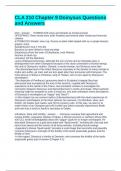CLA 210 Chapter 9 Doinysus Questions
and Answers
Intro - answer PARENTAGE Zeus and Semele (a mortal woman)
OFFSPRING Three mortal sons (with Ariadne) and several other mortal and immortal
children
ATTRIBUTES Wreath, wine cup, thyrsus (a plant stalk topped with ivy or grape leaves),
grapes, vines
SIGNIFICANT CULT TITLES
Bacchus (a name linked to ritual worship)
Eleuthereus (from the town of Eleutherae, near Athens)
Iacchus (a ritual cry)
Limnaeus (Of the Marshes)
Lysius (Releaser)-Dionysus, although the son of Zeus and an Olympian god, is
distinguished from other Olympians because of his close connection to human beings.
Not only is Dionysus's mother, Semele, a mortal woman, but Dionysus even dies
-The dismemberment of the infant Dionysus resonates in the demise of many mortals in
myths who suffer, go mad, and are torn apart after their encounter with Dionysus. The
most famous of these is Pentheus, king of Thebes, who is torn apart by Dionysus's
worshippers.
-The depiction of Pentheus's gruesome death in Euripides's tragedy Bacchae
(discussed and excerpted at the end of this section), coupled with Dionysus's
experience at the hands of the Titans, has prompted scholars to investigate the
connection between Dionysus and dismemberment in myths and rituals. What symbolic
meaning might be assigned to such a brutal act, one that contradicts many descriptions
of Dionysus's worshippers as "happy" and "blest"?
-in this chapter too we connect myths of dismemberment with the ritual experiences of
Dionysus's worshippers in the three spheres he oversees: (1) viticulture, wine, and
fertility; (2) theater and masks; and (3) his mystery cults. In this way, we also try to
make sense of an Olympian god who (unlike any others) actually experiences death
and even has a tomb in Apollo's sanctuary in Delphi.
Viticulture, Wine and Fertility - answer -Dionysus oversaw both agricultural and
human fertility. Augustine, Bishop of Hippo, a Roman province in northern Africa (354-
430 CE), wrote knowledgeably about the "pagan" gods he no longer worshipped. He
described Dionysus as a god associated with "liquid seeds," including the vital sap and
juices from plants and the semen of all living animals, including human beings
-Augustine's phrase "liquid seeds" provides a vivid image that succinctly and plausibly
connects Dionysus's oversight of the fertility of the lands (especially grapes) and the
fertility of men.
-In this regard, Dionysus is similar to Demeter, who oversees the fertility of the lands
(especially grain) and of women (Chapter 4.1).
, -Unlike Demeter, however, Dionysus's oversight of fertility is very often infused with
humor and danger.
The Anthesteria - answer -The springtime festival of the Anthesteria (from anthos,
flower) celebrated Dionysus's gift of wine to humankind; it concluded with a sacred
marriage that symbolically drew the fructifying powers of the god into the city.
-The first day of the festival was called Pithoigia (Jar-Opening), after the large storage
jars of wine (pithoi, the plural of pithos) that were brought into the center of Athens from
the countryside and opened.
-The second day of the festival was called Choes (Wine Jugs), after the jugs holding
roughly two liters of wine that were used in the day's drinking contest. This day was
especially eerie, not only because of the presence of the dead but also because of a
rather unusual citywide drinking contest, the rules of which inverted the usual practices
at a drinking part
-The Anthesteria's rules did not support conviviality but instead imposed an unusual
silence on the city.
-After the contest, when the sun had set, participants marched toward Dionysus's
temple "in the marshes" (so identified because it was located in a marshy section of the
city, which has not yet been conclusively identified). There, they dedicated their choes
and their garlands to the god. Dionysus's cult title Limnaeus (Of the Marshes) refers to
his worship at this temple.
-On the third day of the festival, called Chytroi (Pots), three more events took place
(some of these may have taken place on the night of the second day), and the mood of
the festival changed from somber to joyful.
-The basilinna may be a symbol for the city of Athens, and this ritual marriage can be
interpreted as a symbolic marriage between Dionysus and the city itself, one that
harnesses Dionysus's exuberant fertility (and perhaps, by extension, that of the city's
male residents) to the needs of the city and ensures the reproduction of the next
generation. I
The Symposium - answer -Whereas the Anthesteria celebrates the production of
wine from grapes and male fertility in the context of marriage, the symposium is a space
where Dionysus's wine conjures decidedly male conviviality and sexuality unattached to
reproduction. Symposia were gatherings of men, particularly those from elite classes,
that took place in the male quarters of private houses. Symposiasts were waited on by
female and male servants, musicians, and female hetaerae, a Greek term for women
who provided both musical and sexual entertainment. Whereas symposia were often
congenial and boisterous gatherings fueled by wine, they were also occasions when
men could examine their world through dialogue and engage in self-examination. Both
kinds of activity were encouraged by Dionysus's presence in the form of wine.
-Yet these eyes may have served another purpose: they made the drinking of wine
mimic the experience of looking into a mirror. They suggest that Dionysus's liquid had
the potential to transform men at symposia into seekers of wisdom about themselves.
-Yet wine did not always have such a positive transformative effect. If it was not
sufficiently diluted with water or if it was drunk in excess, wine could transform men into




